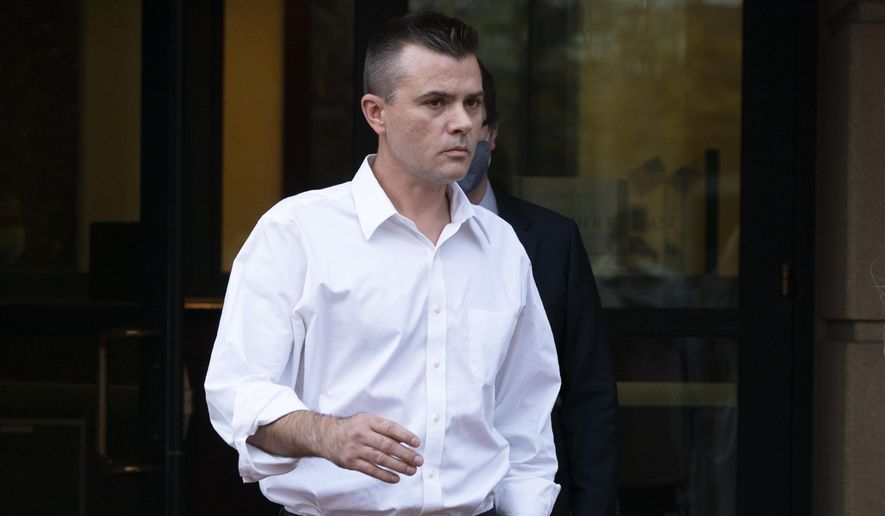Jurors in the trial of Igor Danchenko, the primary source for the Steele dossier, deliberated for roughly four hours on Monday without reaching a verdict and will continue their work Tuesday morning.
The jury must decide whether Mr. Danchenko lied to the FBI about how he obtained information for the Steele dossier, a collection of unproven claims intended to be used ahead of the 2016 election to tie former President Donald Trump to Russia.
Deliberations started Monday after both sides delivered their closing arguments to jurors.
Defense attorney Stuart Sears opened his closing argument by accusing special counsel John Durham’s team of ignoring information that “doesn’t support their narrative that he’s a liar.”
“The special counsel was focused on proving crimes at any cost rather than proving whether a crime had occurred,” Mr. Sears told jurors in an Alexandria, Virginia, federal courtroom.
“They started out with the presumption of guilt and read guilt into every piece of evidence they saw,” Mr. Sears continued, adding that he was “perplexed” by the weakness of the case.
Mr. Danchenko is charged with four counts of making false statements to the FBI in January 2017 about his contacts with Sergei Millian, who at that time was the president of the Russian-American Chamber of Commerce.
Mr. Danchenko was initially charged with a fifth count but that charge was thrown out by a federal judge on Friday in a major blow to Mr. Durham.
Prosecutors say Mr. Danchenko falsely told the FBI that he had obtained information that was used in the dossier in an anonymous phone call from a man he believed to be Mr. Millian.
The dossier, a collection of unverified allegations tying Mr. Trump to Russia, was compiled by British ex-spy Christopher Steele and commissioned by Democrats ahead of the 2016 election.
Information in the dossier was partly used to obtain a surveillance warrant for Carter Page, a Trump 2016 campaign aide who was suspected of working with Russia to influence the election.
Mr. Page was never charged with a crime and no public evidence emerged to support the accusations.
Prosecutor Michael Keilty told jurors that Mr. Danchenko never received an anonymous phone call and made the whole thing up.
In his closing argument, Mr. Keilty pointed to the fact that Mr. Millian was an unabashed supporter of Mr. Trump and had no previous communications with Mr. Danchenko.
“Why would Sergei Millian, a vocal supporter of Donald Trump, call and offer damaging information about Donald Trump to a person he’s never met before; he’s never spoken with before? It doesn’t make any sense,” Mr. Keilty said.
“This about what you would have to accept to believe the defendant’s story,” Mr. Keilty continued, adding that there is no evidence in phone records to suggest the two ever spoke.
Both sides also put forward starkly different views of Mr. Danchenko’s meetings with the FBI.
Prosecutors depicted him as a desperate man offering ever-changing explanations about how and when he spoke with Mr. Millian to escape accountability for his alleged lies.
Mr. Keilty read from interview transcripts in which Mr. Danchenko tells investigators he had one call with Mr. Millian, later saying it was “multiple calls,” and then telling FBI agents it was one anonymous call with a man he believed to be Mr. Millian.
“That’s a plain admission of guilt in the defendants’ own words,” Mr. Keilty said. “He goes from one call to multiple calls. It’s hard to keep track of lies in repeating a story.”
But Mr. Sears said Mr. Danchenko volunteered to talk with the FBI to assist their efforts to verify the Steele dossier. He said Mr. Danchenko was being honest when he told agents that he wasn’t sure who called him.
“He said, ’I don’t know.’ He was trying to help. He was trying to assist the investigation and now they are indicting him? They are prosecuting him?
“He’s gone above and beyond anything that could have been expected of him to help our government,” Mr. Sears continued.
• Jeff Mordock can be reached at jmordock@washingtontimes.com.




Please read our comment policy before commenting.